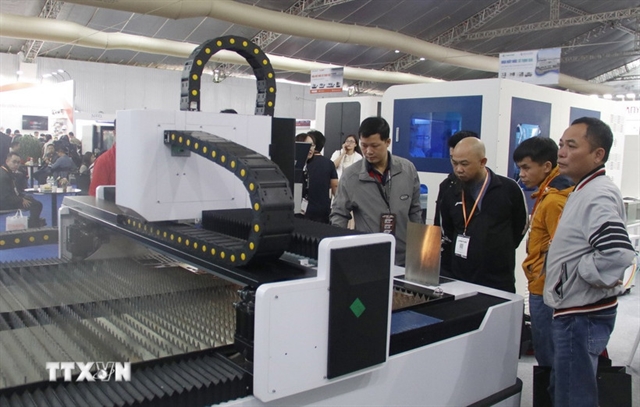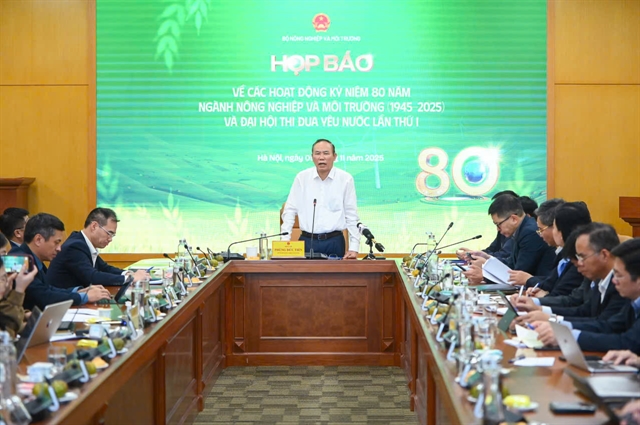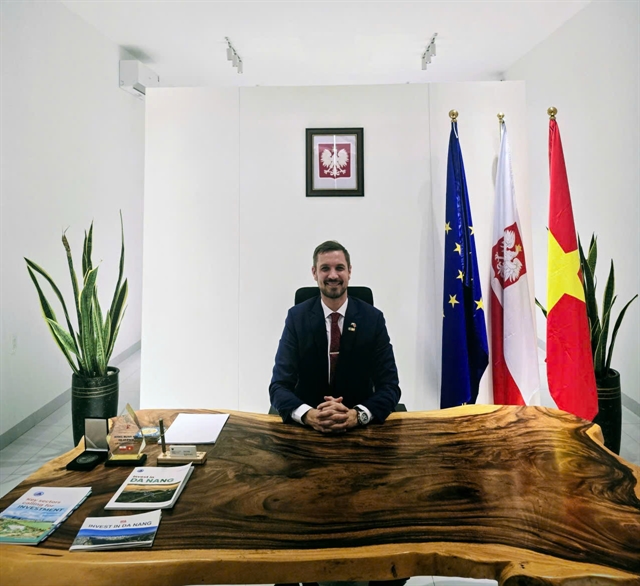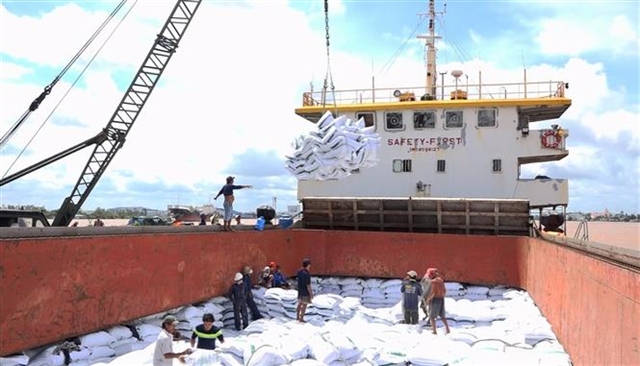 Opinion
Opinion

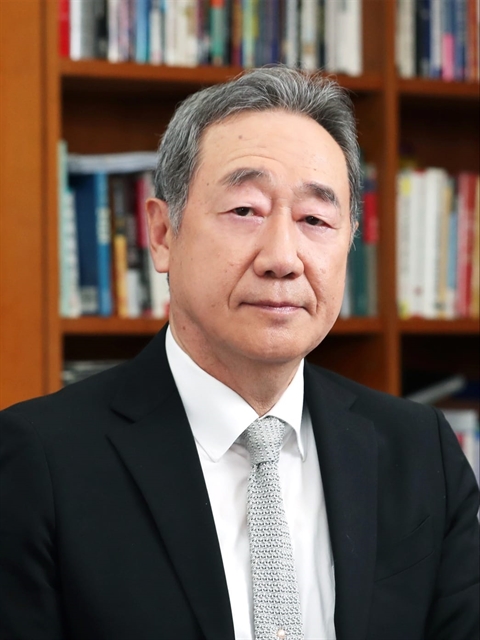 |
| Dr Dae-Whan Chang, Chairman of the Maekyung Media Group, founder of the World Knowledge Forum. Photo Courtesy of Maekyung Media Group |
As the 26th World Knowledge Forum unfolds in Seoul from September 9 to 11, Dr Dae-Whan Chang, Chairman of the Maekyung Media Group and founder of the forum, talks to Việt Nam News reporter Thu Vân about its vision and the challenges faced at a time shaped by geopolitical turbulence, climate crisis, and rapid advances in artificial intelligence.
In an age of geopolitical turbulence, climate crisis, and artificial intelligence, what kind of 'knowledge' do you believe will determine the survival and success of nations?
Throughout history, the survival of nations has rested on two pillars of knowledge.
First, externally, the insight to read and interpret rapidly shifting international dynamics with precision. Today, the contours of the US-China strategic rivalry or the restructuring of global supply chains are not mere diplomatic issues, they cut directly into a nation’s economic, security and industrial policies. Without a strategic mindset to grasp these changes and adapt flexibly, sustained prosperity is impossible.
Second, internally, the capacity to raise the added value of a nation’s industrial portfolio through technology. Fields such as artificial intelligence, semiconductors, biotechnology and quantum science are not just matters of competitiveness; they are matters of economic sovereignty. Only nations that secure technological leadership and generate new value on that foundation can hold influence in the global competition.
In short, a discerning eye for international affairs and the power to cultivate frontier technologies must be in balance for a nation to ensure survival and success. It is no coincidence that this year’s World Knowledge Forum pillars include New Order focusing on geopolitics, AI Transition on the technological revolution, and Great Voyage of Industries on energy, mobility, and defence - reflecting precisely this dual imperative.
WKF 2025 carries the theme 'New Odyssey: Navigating the Great Transition'. In your view, what are the most critical 'transitions' humanity must prepare for in the next decade?
The defining transition of the coming decade will undoubtedly be the AI-driven technological revolution.
Of course, geopolitical rivalries, climate challenges and the global energy shift will all intersect in complex ways. Yet, the gravitational force reshaping them all is artificial intelligence.
AI is moving far beyond automation, advancing into knowledge creation, decision-making, and even creative activity. This will not only redefine labour markets and industrial structures, but also alter how societies function and how human identity itself is understood.
History teaches us that Britain’s mastery of the Industrial Revolution secured its global dominance, while the United States’ leadership in the Information and Digital Revolutions tilted the Cold War in its favour. In the same way, the AI revolution will not simply be a matter of technological progress; it will be an epochal realignment of world order.
The nations that rise will be those that harness AI effectively and integrate it rapidly and responsibly into their economies and societies. AI is not an option, it is an unavoidable transformation that will determine survival itself.
Many forums exist today, from Davos to regional summits. What makes the World Knowledge Forum unique in amplifying Asia’s voice in global governance and knowledge exchange?
The World Knowledge Forum places particular emphasis on deriving practical solutions through in-depth, expert-led sessions across specialised fields. Beyond focusing solely on economics, it aims to generate profound insights from a long-term perspective.
Furthermore, the World Knowledge Forum occupies a unique position as a practical knowledge platform representing Asia’s voice. Asia accounts for more than half of the world’s population and has emerged as a hub for economic growth and technological innovation. By contributing an Eastern perspective to global discourse, WKF achieves balance while offering the most inclusive stage for knowledge exchange - bridging emerging and advanced economies, businesses and governments, academia and civil society.
In addition, as a privately initiated forum, WKF enjoys greater independence and neutrality, enabling more candid and constructive discussions.
In the era of artificial intelligence, how is knowledge being redefined and what does this mean for societies and economies?
In the AI era, knowledge itself is being redefined at its core. Traditionally, knowledge was about what we know. Today, it is increasingly about knowing what we do not know.
Most cognitive activities rooted in past data, information gathering, analysis, forecasting, pattern recognition, even creative outputs, are already being performed, or soon will be performed, by AI.
Where, then, does human knowledge reside? It lies in identifying the boundaries of AI, in understanding its limitations, and in applying this awareness to strategic judgment and problem-solving. The real question is not “What must we know?” but “What problems can AI not solve? What judgments cannot be reduced to data?”
Thus, knowledge in the AI era is not about accumulating facts or calculations. It is about uniquely human capacities: making strategic decisions under uncertainty, assigning meaning in complex contexts, exercising ethical judgment, and building trust through empathy. At both the national and individual levels, success will hinge on this ability, to recognise AI’s limits and to create new value beyond them.
As a media leader, what is your vision for the future of journalism in a world dominated by digital platforms and AI-driven content? What lessons has Maekyung Media drawn from navigating digital disruption, and how do you see media sustainability in the next 10 years?
In this new age, the degree to which AI is leveraged will determine the fortunes of companies, individuals and indeed entire nations. Media organisations are no exception.
In 2023, Maekyung Media Group launched Miracle Eye, a platform dedicated to AI-related news coverage. At the same time, MBN introduced a next-generation AI-driven editorial and information system that integrates AI into every stage of news production. During last year’s general election, AI was used extensively in producing graphics for all 253 electoral districts.
Yet for media to fulfil its role, financial sustainability is essential. To this end, Maekyung Media is expanding beyond traditional media businesses, actively pursuing new revenue streams across diverse sectors. For example, through M-Block, a subsidiary dedicated to blockchain, we have entered the digital asset field, providing readers with insights into cryptocurrency investment and blockchain trends.
Sustainable journalism will require both innovation in content and resilience in business models. We are committed to both.
What legacy do you hope the World Knowledge Forum will leave, not only for Korea, but for Asia’s place in the world?
Korea lies at the crossroads of great powers - neighbouring North Korea, China and Russia - making it a geopolitical fulcrum where diplomacy, security, and economic strategy converge. At the same time, Asia holds boundless potential for growth and innovation.
Against this backdrop, I hope the World Knowledge Forum will be remembered not merely as an event, but as a true marketplace of wisdom - where insights in diplomacy, economics, and technology converge to generate practical solutions.
Asia is no longer a periphery. Since the US 'pivot to Asia' in 2008, the region has been at the centre of global power competition. Over the next 30 years, Asia will shape the transformation of the global diplomatic and economic order.
The Forum’s mission, therefore, is not only to analyse these changes but to chart the path forward for Asia - fostering cooperation, resilience and sustainable growth. It must amplify Asia’s voice and elevate its standing on the global stage, while shining a spotlight on the dynamism of Southeast Asia and the contributions of emerging economies.
My vision is for the World Knowledge Forum to be remembered as both a beacon of Korea’s leadership and a torchbearer for Asia’s collective voice in the world. VNS


